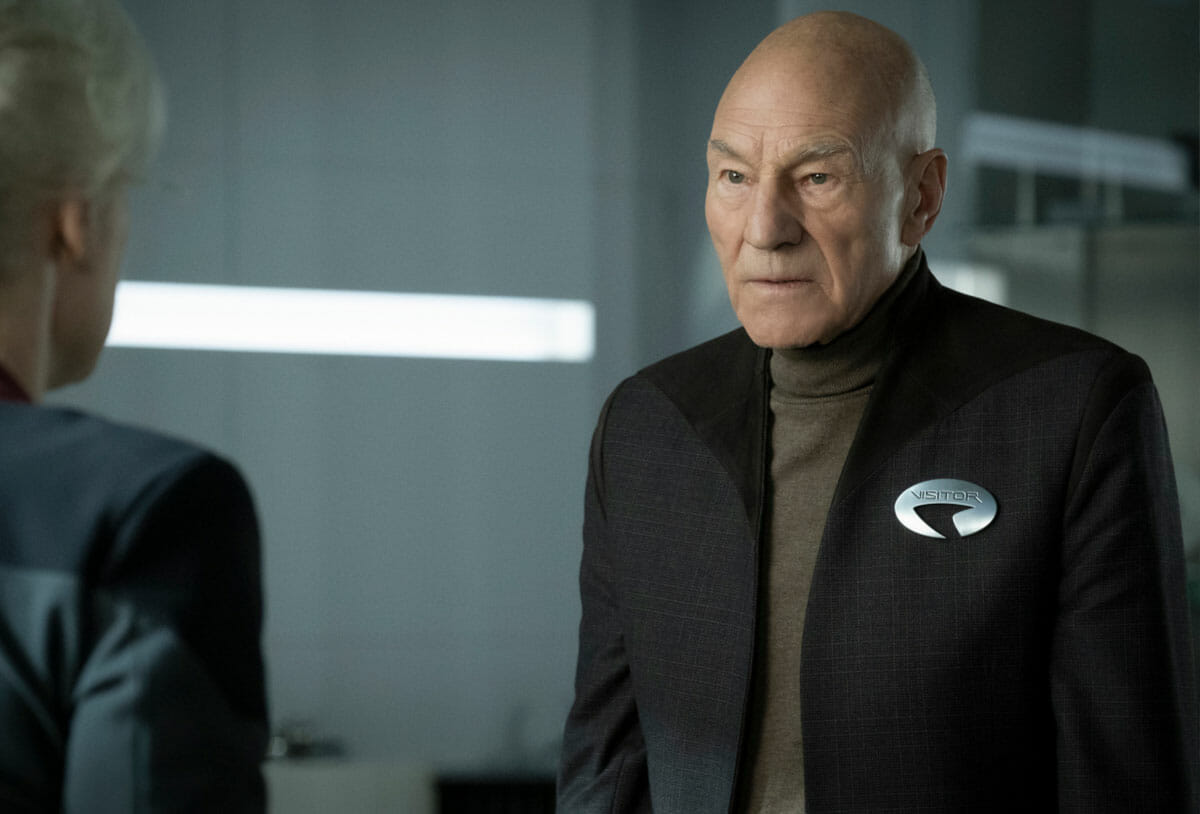
Patrick Stewart as Jean-Luc Picard in Star Trek: Picard (CBS)
Photograph credit: CBS
Binge-watching a hopeful future

Rev. Jerrod H. Hugenot
April 24, 2020
While we are practicing socially distant life and many are necessarily working, learning, and living at home, the temptation is to worry and to let anxiety kick into high gear.
One stress release is binge streaming TV shows and films. (Balance with exercise and healthier food please!) Netflix, Hulu, YouTube, Disney + and other platforms are enjoying more use as people work, learn, and live at home for the safety of our communities. Nonetheless, you may find yourself pondering what is else you can watch when you feel like you’ve binged everything.
For me, watching science fiction has long been a “go-to” genre, particularly episodic television. (Great novels, short stories, and films abound, but for brevity, my scope is more “small screen” in this article.)
Science fiction can help us imagine a future or alternative reality. Such material is often the impetus for humanity to engage possibilities that move from fiction to reality. (I say this writing on a device that might as well be from Star Trek: The Next Generation, which popularized the idea of PADDs, or personal hand-carried data devices to work from on starships, now plentiful in the here and now).
On the flip side, science fiction also deals with the apocalyptic, the dystopian, and the bleak. Such stories serve as cautionary tales and ways that creators look at the here and now and extrapolate the possible outcomes. Looking back at different shows over the decades, you can see clearly the optimism of the 1960s up against the social tumult in the original series of Star Trek. You find the paranoia of post-9/11 America in the reboot of Battlestar Galactica. The short-lived (and much loved) Firefly series gave perhaps the edgiest suggestion: humanity will go out into the depths of space and find only each other, human failings included, if not intensified.
Science fiction can help us imagine a future or alternative reality. While living in the uncertainty of the here and now, and learning the opportunities and limits of conducting work and worship via digital tools, here are three science fiction shows available to stream.
While living in the uncertainty of the here and now, and learning the opportunities and limits of conducting work and worship via digital tools, here are three shows available to stream:
Star Trek: Picard (CBS Access) recently completed its first season, revisiting Jean-Luc Picard’s years after the last Star Trek: The Next Generation feature film. Living in self-exile on his family’s vineyard estate in France, Picard left Starfleet years earlier in protest for their handling of two crises. First, Starfleet began a herculean level of commitment relocating the residents of the Romulan Empire ahead of a devastating supernova explosion. Then, this altruism halted when the Federation also suffered an unexpected “attack from within” which ended the Romulan mission and turned Starfleet’s priorities inward to “Federation First” thinking, shutting down the interstellar aid.
For viewers who love Star Trek’s “mission of the week” formula, this newer series may take some adjustment of expectations. Sir Patrick Stewart grounds the production with his pensive and considered Picard as he becomes convinced something different is afoot, yet his old colleagues dismiss him outright. Picard finds himself struggling to gather resources, and along the way, he is confronted with the realization he made mistakes himself along the way.
Further, we see the development of Star Trek series away from the highly idealized understanding of humanity’s future, as imagined (and controlled) by the vision of series creator Gene Roddenberry. The “shades of grey” that crept into the series after Roddenberry’s passing are now more fully explored, presenting stories in the “CBS Access” era of the series that divide the fan base, yet show a much more nuanced and flawed understanding of what it means to be human.
Here we encounter Picard the old man, not able to do what he used to, and his world, once comfortable and familiar, is fractured. Nonetheless, his integrity and resolve will endure. As he says in one of the latter episodes of the season: “fear is an incompetent teacher” (Episode 10). What a word to hear in the midst of these times!
Doctor Who (original run 1963-1989, Britbox; revival 2005 to present, Amazon Prime and other streaming sites).
For those wishing to deep dive (or revisit again) the longest-running science fiction show in the world, may I humbly suggest that the entire series has moments of great wisdom throughout its long run? From my childhood watching the series in the late afternoons on my PBS TV station to my adulthood, Doctor Who has been a constant source of entertainment as well as engagement.
In the most recent season, Doctor Who provided yet another moment of quotable wisdom. As the Doctor dealt with the unexpected return of her old enemy the Master, the fate of the world looks rather. Yet, in her long life, the Doctor has the perspective that we are likely all needing to hear: “These are dark times. But they don’t sustain. Darkness never sustains, even though it feels like it might” (Doctor Who, revival era, Season 12, episode 2 “Spyfall”).
Further, as COVID-19 spread global fear and unrest, the producer Chris Chibnall worked with Jodie Whittaker, the present actor portraying the Doctor, to record a brief scene sharing the Doctor’s words of encouragement to children as well as the grown-ups, all in need of a good word.
Throughout its long years of adventures, the Doctor has changed appearances and personalities (and with the current Doctor, even gender), yet you can see something about the Doctor that resounds in resolve and fortitude. Whoever is portraying the Doctor, whichever era of the show (past or present, from grainy old black and white or in HD glory), you get the message that we are better off as a human race when we aspire to rise above the temptations that drag us down into misery or avarice. In the old days, the joke was to watch the sets wobble and the effects try to make use of a limited budget, yet the Doctor’s ethos, alien as it may be, abides.
Babylon 5 (Amazon Prime, streaming)
I missed Babylon 5 the first time it aired, so thanks to my spouse’s far greater taste in SF, I connected to this series created by the prolific J. Michael Straczynski. The show aired over five seasons with some hardship behind the scenes, as the series production never quite knew if they would achieve the projected five seasons. (Indeed, the TNT Network picked the show up for a fifth and final season, which allowed many of the storylines not to be left hanging, though the fourth season was completed without that assurance in hand.)
Among the science fiction shows I have watched, hands down the B5 series takes religion the most seriously. (You may fight me in the comments section.) The series takes place in our future and after a tenuous peace is achieved between several races that have had long enmity between one another. The space station Babylon 5 is constructed as a place where these races can intermingle, conduct business and diplomacy, and hope to foster something better between their races.
The Earth delegation manages the station’s day-to-day operations, providing humor (sometimes) and great drama (most of the time) in managing this space station “all alone in the night” (as each episode’s narration intones in the opening credits). The show builds out an immersive universe, demonstrating the value of tying together a serialized (and therefore quite binge-watch worthy) narrative. Great character actors help the various human and alien protagonists and antagonists delve into the material as the narrative progresses. The show does not miss its chance to explore pathos, often showing characters wrestling with matters of conscience.
One character is the Minbari ambassador Delenn, who is part of the religious caste of Minbari society, taking a more contemplative approach to the affairs and tumult of the moment. (Another caste of Minbari are perpetual war hawks, showing that even in an advanced society, certain familiar tensions we know are reflected.) Delenn’s character provides commentary on the unfolding events with wisdom.
In a second season episode, the station is wracked by fear of a plague on board. Great hysteria follows, as the differences between the races escalate into xenophobia and moments of violence. Delenn and her assistant Lennier find themselves in a tense moment, and she reminds her younger colleague of the importance of maintaining balance. In a time of great challenge, Delenn imparts the good word: “Faith manages.” The two of them will go the extra mile by joining the most affected race on the station into quarantine, choosing to be with those who are ailing, even if it means they are the only ones to walk out alive later on. The disease does not crossover the various species, but the anxiety among the humans and aliens is indeed infectious. (Cf. Babylon 5, Season 2, Episode 18, “Confessions and Lamentations”)
Behind the scenes, these words helped the cast and production cope with the ever-present question of cancellation or setback. Within the world of the show, we see as things escalate well beyond any one race’s capacity to handle the tumult, the earnest and steadfast help the galaxy find a hard-won future.
In the anxious times of COVID-19, may we remember that “Faith manages” as we support one another.
Rev. Jerrod H. Hugenot is Associate Executive Minister of the American Baptist Churches of New York State.
The views expressed are those of the author and not necessarily those of American Baptist Home Mission Societies.


